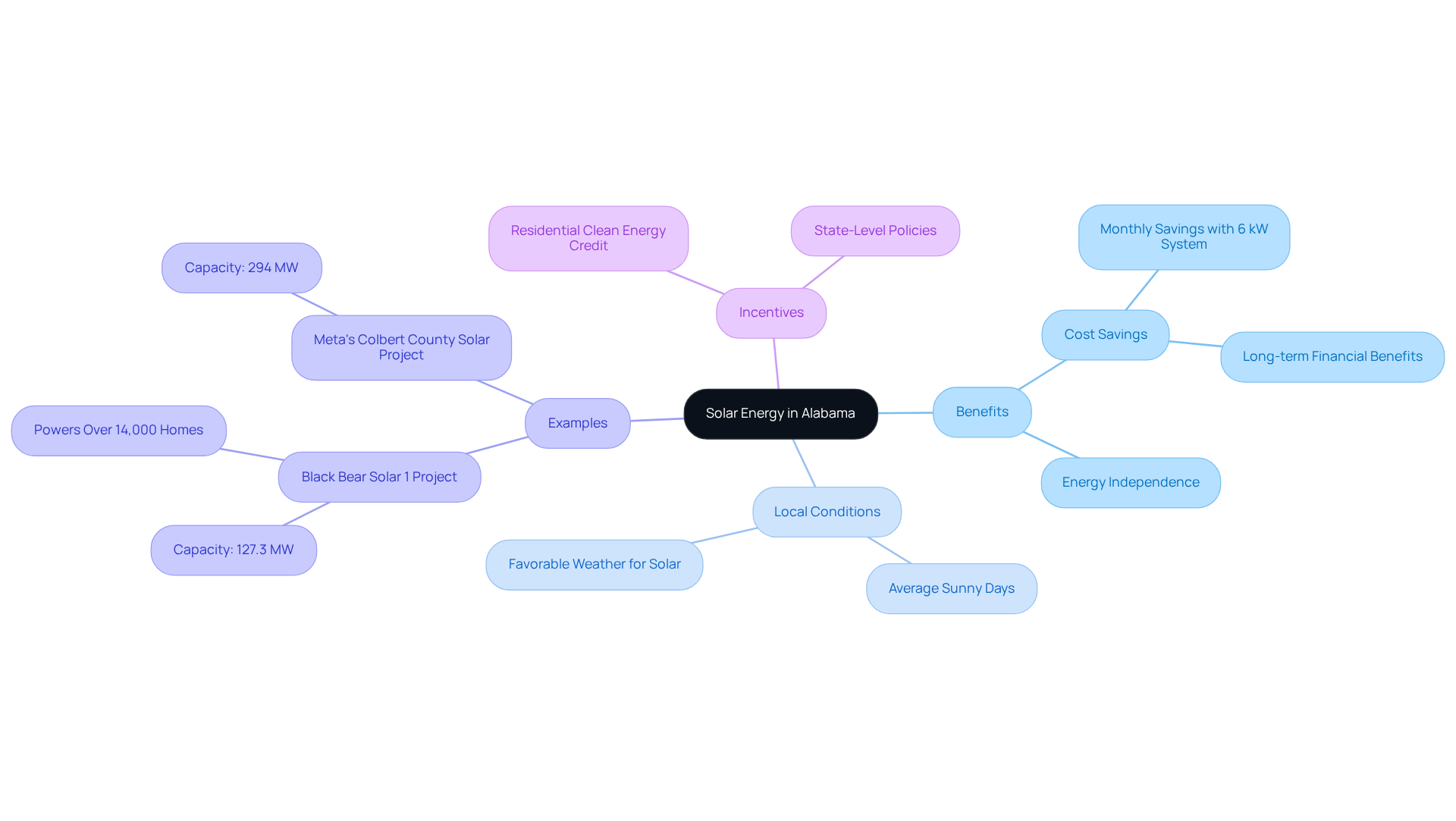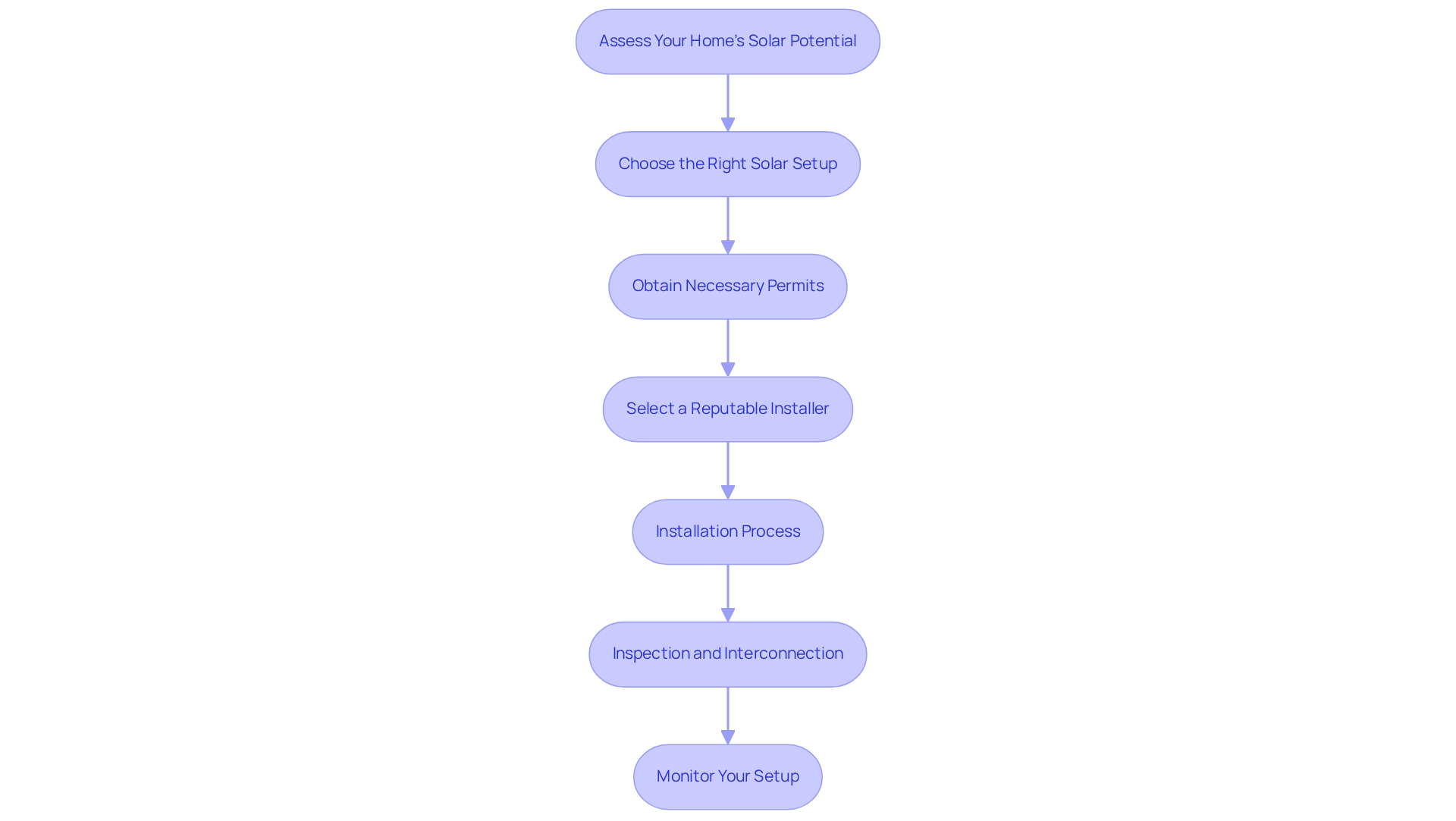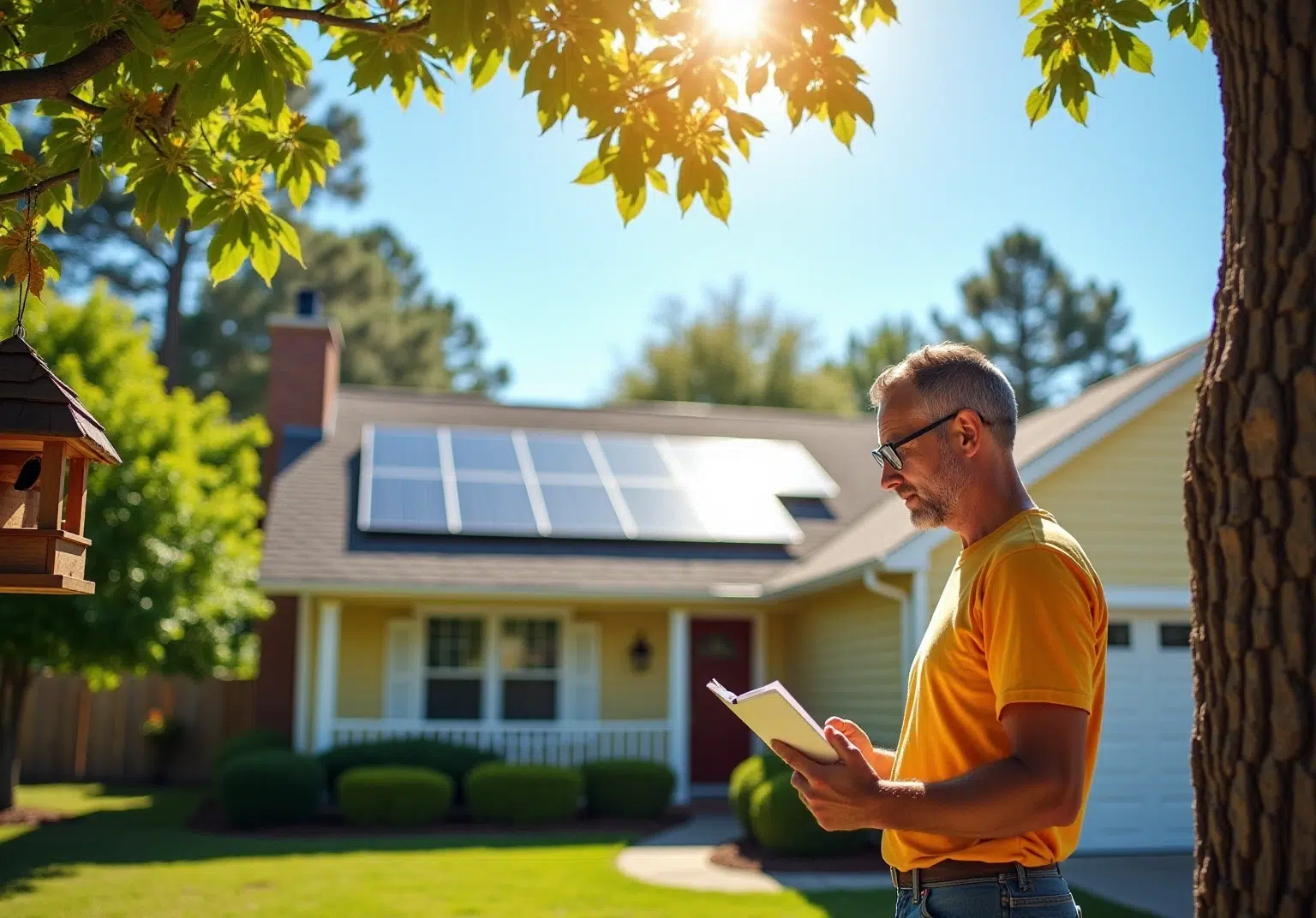Overview
Homeowners in Alabama often feel the weight of rising energy bills, and it’s completely understandable to seek a solution. The journey towards mastering solar energy can be incredibly rewarding, and it begins with assessing your solar potential. By choosing the right setup, you can unlock a world of benefits that not only ease your financial burden but also contribute to a healthier planet.
Imagine significant savings on your energy bills, along with the possibility of increasing your property value. These financial advantages are complemented by the environmental benefits of transitioning to renewable energy sources, especially in Alabama’s sunny climate. It’s common to feel overwhelmed by the options available, but remember, you are not alone in this journey. Together, we can explore the possibilities that solar energy offers.
Now is the perfect time to consider how solar energy can lead to greater energy independence for you and your family. The path to this independence is filled with guidance and support, ensuring you make informed decisions every step of the way. We invite you to reach out and discover how we can assist you in embracing this sustainable solution. Let’s work towards a brighter, more sustainable future together.
Introduction
We understand that managing energy bills can be a source of stress for many homeowners in Alabama. Harnessing the power of the sun offers not just a solution to energy consumption but also a pathway to greater financial stability. With an impressive average of 213 sunny days each year, Alabama presents a unique opportunity for residents to embrace solar energy, potentially saving over $118 a month on electricity bills.
However, it’s common to feel overwhelmed by the journey to solar adoption—navigating local regulations, understanding installation processes, and evaluating financial incentives can seem daunting. Together, we can explore how homeowners can effectively navigate these complexities to unlock the full potential of solar energy in Alabama, paving the way for a brighter, more sustainable future.
Explore the Fundamentals of Solar Energy in Alabama
Are you feeling overwhelmed by rising energy bills? Solar power offers a nurturing solution, harnessing sunlight through photovoltaic (PV) cells to convert it into electricity. With Alabama enjoying an average of 213 sunny days each year, it stands out as an ideal location for solar in Alabama. Homeowners can significantly benefit from photovoltaic power, not only by reducing electricity costs—potentially saving around $118.37 each month with a 6 kW system—but also by gaining greater energy independence.
Consider the inspiring example of in Montgomery, boasting a capacity of 127.3 MW and the ability to power over 14,000 homes. This initiative showcases Alabama’s commitment to embracing renewable resources. We understand that navigating local regulations and available incentives, such as the Residential Clean Energy Credit, can feel daunting. However, grasping these elements is crucial for maximizing the benefits of renewable energy installations.
As renewable power specialist Frances Beinecke wisely notes, ‘We have this convenient fusion reactor in the sky called the sun; you don’t have to do anything, it just operates.’ This statement beautifully underscores the simplicity and effectiveness of utilizing sunlight for solar in Alabama, offering peace of mind to homeowners. Together, we can explore how solar in Alabama can transform your energy experience, providing not just savings but a sustainable future.

Guide to Installing Solar Panels: Steps and Considerations
- Assess Your Home’s Solar Potential: We understand that evaluating your roof’s orientation, shading, and structural integrity can feel overwhelming. A south-facing roof with minimal shade is ideal for optimizing sunlight capture, and comprehending function will empower you to decide the best location and arrangement for your setup.
- Choose : It’s common to wonder which solar configuration—grid-tied, off-grid, or hybrid—best suits your power requirements and budget. Each option offers unique benefits tailored to your lifestyle and energy usage. Additionally, considering the best battery options, such as lithium-ion or lead-acid batteries, can significantly enhance your system’s performance and reliability.
- Obtain Necessary Permits: Navigating local regulations can be daunting, but familiarizing yourself with the necessary permits before installation is crucial. This may include zoning permits and electrical permits, which ensure compliance and peace of mind.
- Select a Reputable Installer: Choosing a qualified installer can make all the difference. Research professionals with a proven track record in residential projects related to solar in Alabama. Look for those who prioritize customer service and have experience with local regulations. As Andy Sendy, a trusted figure in the renewable energy sector, emphasizes, “These companies tend to care more about you and your specific job.”
- Installation Process: During installation, the installer will mount the photovoltaic panels and connect them to the inverter, ensuring that everything complies with local codes and standards. Understanding how solar panels operate will help you appreciate the installation process and its impact on energy generation.
- Inspection and Interconnection: After installation, your setup will be inspected by local authorities. If you have a grid-tied system, it will connect to the grid, allowing you to benefit from net metering where available. However, it’s important to note that Alabama does not have net metering laws, meaning homeowners may not receive compensation for excess power produced, which could affect the overall return on investment for solar in Alabama.
- Monitor Your Setup: Regularly monitoring your energy production is essential to ensure your setup operates efficiently. Utilizing monitoring tools helps identify any issues early, ensuring optimal performance. Moreover, considering the financial implications of your investment is vital; for example, an 8 kW photovoltaic array costs roughly $19,935 with a payback duration of 10.9 years, and the federal tax credit for renewable energy currently provides a 30% rebate on the setup expense. By understanding these factors, including the importance of regular panel maintenance and innovative cleaning solutions, we can make informed decisions about our energy investments together.

Analyze the Financial Benefits: Costs, Savings, and Incentives for Solar Energy
We understand that managing energy bills can be a significant concern for homeowners, especially with the options available for solar in Alabama. On average, the expense of a photovoltaic panel setup is roughly $30,946 after utilizing the federal tax credit for a standard installation. This investment can lead to substantial savings, with an estimated total of around $30,270 over a 25-year period. The payback period for these systems is generally around 10.27 years, making photovoltaic power a financially appealing choice.
It’s common to feel uncertain about such an investment, but consider this: the federal investment tax credit (ITC) currently offers a 30% decrease in initial expenses, which will lower to 26% in 2033 and 22% in 2034. Additionally, local incentives, such as property tax exemptions, may also be accessible, making solar in Alabama an economically viable option for many homeowners.
Furthermore, installing photovoltaic panels can enhance your home’s value by approximately 4.1%, translating to an average rise of about $9,078. Together, these financial incentives create a compelling case for exploring renewable power. When weighing the long-term savings and advantages against , it’s clear that the benefits are significant. Let’s work towards a brighter, more sustainable future together.
Understand the Environmental Impact: Solar Energy and Sustainability
We understand that rising energy bills can be a significant concern for homeowners. Solar power presents a clean, renewable resource that not only addresses these worries but also significantly decreases greenhouse gas emissions compared to fossil fuels. By installing photovoltaic panels, you can actively contribute to reducing air pollution and dependence on non-renewable power sources. In Alabama, where solar in Alabama demonstrates abundant sunlight power potential, transitioning to renewable sources can help our state move towards a more sustainable energy future. Notably, successful initiatives like the River Bend Solar project have proven their effectiveness, reducing carbon emissions by an impressive 100,000 tons annually.
Imagine the benefits of photovoltaic installations, which can enhance your property values and promote energy independence, aligning with broader environmental goals. With a total investment of $914 million and an installed capacity of 862 MW in the state, our renewable energy landscape is rapidly evolving.
Powercore Electric, a family-owned company with over 30 years of experience serving California, emphasizes a community-focused approach and personalized service. Their dedication to outstanding service has garnered considerable acclaim from satisfied clients, establishing them as a reliable ally for environmentally conscious homeowners seeking dependable energy solutions. As Ryan, a recent customer, shared, “They were fast, efficient, and stayed on schedule for ,” reflecting the quality craftsmanship and customer-first ethos that Powercore Electric embodies. Together, we can work towards a brighter, more sustainable future for our homes and communities.
Conclusion
Harnessing solar energy in Alabama is not merely a practical solution for rising energy costs; it is a transformative step towards financial independence and environmental sustainability. We understand that many homeowners are concerned about their electricity bills, and with Alabama’s abundant sunshine and various incentives available, you can significantly reduce those costs while contributing to a cleaner planet.
The article outlines essential steps for homeowners, beginning with:
- Assessing solar potential
- Selecting the right setup
- Understanding local regulations
- Choosing qualified installers
- Recognizing financial incentives that can make solar installations more accessible
Moreover, the potential savings and property value increases further illustrate the long-term benefits of investing in solar energy.
As Alabama continues to embrace renewable energy, the shift towards solar power is not just beneficial for individual homeowners; it is vital for the state’s collective future. By investing in solar energy systems, we can lead the way in promoting sustainability and reducing our environmental impact. Embracing this opportunity is a crucial step towards a brighter, more sustainable future for all, and together, we can make a difference.


